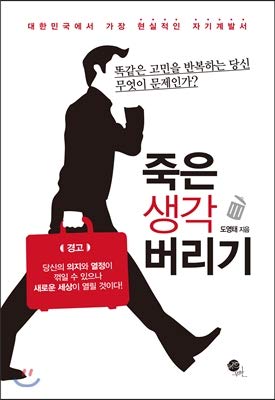Discarding Dead Thoughts (Korean Edition)
Do Young Tae
BOOK REVIEW

The world often drowns in a cacophony of thoughts, emotions, and pressures, shaping an existence that feels like a suffocating maze. In Discarding Dead Thoughts, Do Young Tae shatters this chaos, guiding us towards haunting realizations about the mental and emotional baggage we carry. This Korean edition is not just a collection of insights; it's a relentless call to action, compelling readers to strip away the dead weight of stagnant thoughts and beliefs that shackle them to a life of mediocrity.
Tae's prose serves as a mirror, reflecting the tumultuous landscape of the human experience. Every word penetrates deeply, echoing with the urgency of a soul yearning for liberation. The book resonates with those entangled in the everyday grind-pulsating with the stress and anxiety that stem from unprocessed emotions. It beckons you to confront the shadows within, suggesting that true freedom lies in the act of discarding the thoughts that no longer serve us. This is not merely self-help; this is soul-work, a revolutionary manifesto against complacency.
Readers have had mixed reactions to Tae's work. While many praise the book for its unflinching sincerity and practical guidance, some critics argue that it skirts around the complexities of real emotional healing. However, the very essence of Discarding Dead Thoughts is its raw authenticity. It dares to challenge conventional wisdom, reminding us that to progress, we must first confront what holds us back. This intensity is palpable in passages that ignite a fierce flame of introspection, pushing you to acknowledge the ruins of past thoughts that solidify like chains around your spirit.
Roughly translated, the essence of the text demands readers to "break free from your mental conceptions." It's stirring, confrontational, and unapologetically in your face. In our hyper-connected age, where distractions and normative pressures abound, Tae becomes a beacon, urging you to exorcise the dead thoughts that clutter your mind. The realization that not all thoughts are beneficial is liberating; it encourages you to curate your mental landscape with radical honesty.
The historical and cultural context of this book only amplifies its relevance. In South Korea, especially, where societal pressures weigh heavily on individuals, this exploration into mental freedom resonates like a battle cry. As more people awaken to the value of mental health, Tae's work emerges as a necessary guide, illuminating paths veiled in shadows.
Even in criticism, readers express gratitude; there's an acknowledgment of the uncomfortable discussions that Discarding Dead Thoughts provokes. Some remark on its challenging nature, suggesting that it might be overwhelming for the unprepared reader. Yet, therein lies its genius. Great transformation often arises from discomfort, and Tae doesn't shy away from delivering it straight to your core.
By the end of your journey through the pages, you may find yourself in tears or deep contemplation, a testament to Tae's power to stir something profound within. He has not just written a book; he has orchestrated an existential symphony of thoughts that compel you to embrace both your chaos and your clarity.
So, as you venture into this potent text, be ready. The insights you wrestle with will reverberate in your life long after the final page is turned. The question isn't just about reading a book; it's about confronting your psyche, embracing your truth, and ultimately, reclaiming your narrative. Discarding Dead Thoughts is a treasure trove of inspiration, a resounding beckon to all willing to shed their stagnant thoughts. Don't just be a reader; become an architect of your own emotional liberation. 🌟
📖 Discarding Dead Thoughts (Korean Edition)
✍ by Do Young Tae
2012
#discarding #dead #thoughts #korean #edition #young #DoYoungTae